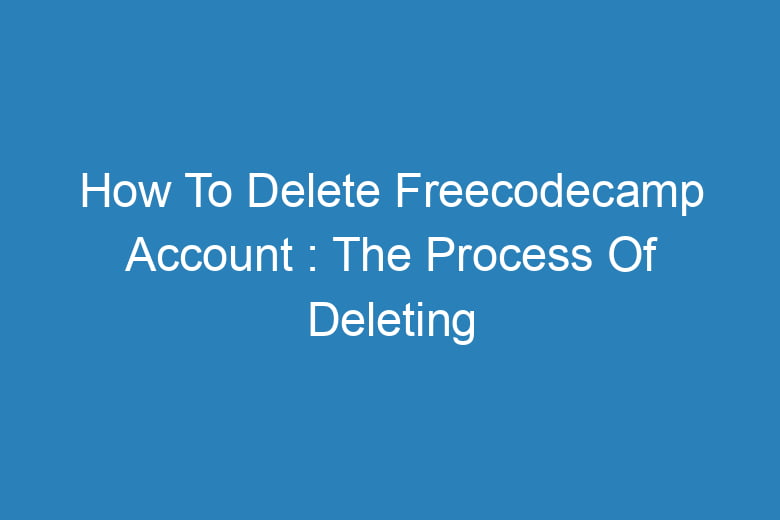Managing your online presence is crucial. Whether you’ve decided to take a break from FreeCodeCamp or have simply outgrown it, deleting your account might be on your to-do list. But how exactly can you delete your FreeCodeCamp account?
This comprehensive guide will walk you through the entire process step by step.
Understanding the Importance
Why Delete Your FreeCodeCamp Account?
Before we dive into the specifics, let’s explore the reasons behind deleting your FreeCodeCamp account. Understanding the importance of this decision is vital.
Protecting Your Privacy
One of the primary reasons to delete your account is to protect your privacy. By removing your personal information from FreeCodeCamp, you can ensure that your data is no longer accessible to the platform.
Managing Your Digital Footprint
In the digital age, your online presence is a significant part of your identity. Deleting accounts that you no longer use or need helps you manage your digital footprint effectively.
Security Concerns
If you have security concerns or suspect any unauthorized access to your FreeCodeCamp account, deleting it is a proactive measure to safeguard your information.
Preparing for Account Deletion
Backup Your Data
Before proceeding with the deletion process, it’s essential to back up any data you want to retain. This might include code snippets, project details, or any valuable information stored on your FreeCodeCamp account.
Resolve Any Pending Issues
Make sure you don’t have any unresolved issues, such as pending projects or disputes, on your FreeCodeCamp account. Addressing these beforehand will streamline the account deletion process.
Step-by-Step Guide to Deleting Your FreeCodeCamp Account
Now that you understand the importance of deleting your FreeCodeCamp account, let’s go through the process step by step.
Step 1: Log In
Begin by logging into your FreeCodeCamp account using your credentials.
Step 2: Visit the Settings Page
Once logged in, navigate to the ‘Settings’ page. You can usually find this option in the top-right corner of the website.
Step 3: Account Deletion Option
Look for the ‘Account Deletion’ or ‘Delete Account’ option within the ‘Settings’ page. This is where you’ll initiate the deletion process.
Step 4: Confirm Your Identity
FreeCodeCamp may require you to confirm your identity for security purposes. Follow the on-screen instructions to complete this step.
Step 5: Delete Your Account
After confirming your identity, you should see the option to delete your account. Click on it to proceed.
Step 6: Confirmation
FreeCodeCamp will likely ask you to confirm your decision once more. This is your last chance to reconsider.
Step 7: Account Deletion Successful
If you’re sure about deleting your account, click ‘Confirm’ or ‘Delete.’ Your FreeCodeCamp account will then be permanently deleted.
Frequently Asked Questions
Is Account Deletion Reversible?
No, once you delete your FreeCodeCamp account, the process is irreversible. Make sure you’re certain about your decision.
What Happens to My Data?
Upon account deletion, FreeCodeCamp will remove all your data from their servers, ensuring it’s no longer accessible.
Can I Create a New Account After Deletion?
Yes, you can create a new FreeCodeCamp account at any time using a different email address.
What If I Forget to Back Up My Data?
Unfortunately, FreeCodeCamp is not responsible for data loss due to account deletion. Always back up your data before initiating the process.
How Long Does Account Deletion Take?
Account deletion typically takes immediate effect, and you should receive confirmation of the deletion promptly.
Conclusion
Deleting your FreeCodeCamp account is a straightforward process when you follow the steps outlined in this guide. Remember to back up any data you want to keep, and be sure about your decision, as it is irreversible.
By taking control of your online presence, you can ensure your digital footprint remains in line with your current goals and priorities.

I’m Kevin Harkin, a technology expert and writer. With more than 20 years of tech industry experience, I founded several successful companies. With my expertise in the field, I am passionate about helping others make the most of technology to improve their lives.

